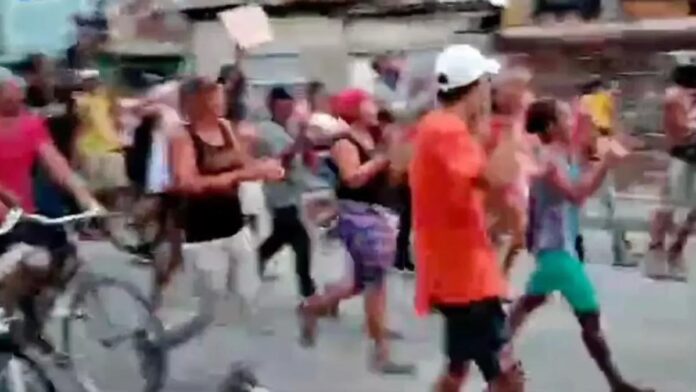
“Freedom!” was one of the cries repeated by Cubans in the protests this Sunday in Matanzas, Santiago de Cuba and Granma.
By 14ymedio
HAVANA TIMES – With the demand for “electric power and food” and a call for “Freedom!” and “No more violence” Cubans took to the streets this weekend in several provinces to demand food and an end to the blackouts. In complete darkness and to the sound of people banging on pots and pans, the residents of the town of Santa Marta, in Matanzas, were the last to join the intense day of protests on Sunday night, mostly in eastern Cuba.
The general unrest was sparked by the lack of food and the electricity cuts of more than 12 hours. In addition to Santa Marta, Cubans took to the streets in El Cobre and the city of Santiago de Cuba, Bayamo, in Granma, and the town of Cacocum in Holguín. The protests were responded to on Monday by President Miguel Diaz Canel, who dedicated a sequence of messages on the social network X.
“In the last few hours we have seen how terrorists based in the United States, whom we have denounced on repeated occasions, encourage actions against the internal order of the country.” The president’s comment makes clear the regime’s response to the protests, which he considers carried out by a minimal group of concerned citizens, who are being manipulated by the “enemies of the Revolution.”
Hours earlier, another tweet from Foreign Minister Bruno Rodríguez pointed to the United States Government as the direct culprit of the “acute economic situation that weighs on the well-being of the Cuban people” and warned its Embassy in Havana that it must “refrain from interfering in Cuban affairs, internal affairs of the country and inciting social disorder.” The US diplomatic headquarters assured, for its part, that it remains aware of the protests and demanded that the Island’s Government respect the rights of the protesters and respond to their demands.
Regarding the protests in Santa Marta, one of the cities where the demonstrations on July 11, 2021 were strongest and which suffered intense repression afterwards, not many details are known. A video posted on Facebook shows a group of people walking and banging on pots and pans peacefully on a dark street, with the only light coming from cars and an electric motorcycle.
The protest of the Holguín residents, started last Saturday in Cacocum, made its way with the sound of banging on pots and pans and shouts of “We want electricity.” A gesture that was replicated on Sunday in the city of Santiago de Cuba and in the town of El Cobre. According to reports from the EFE agency, the demonstration in the second most important city on the Island was started by a group of women asking for food for their children. They were joined by dozens of people shouting other slogans such as “Patria y vida” [Homeland and Life], “Freedom”, “Electricity and food” and “We are hungry.”
After the crowd grew to a considerable magnitude on the Carretera del Morro, close to several poor neighborhoods such as Vista Hermosa, Van Van, Dessy and Altamira, the newly appointed secretary of the Communist Party of the province, Beatriz Johnson Urrutia, got on to the roof of the municipal headquarters of the Communist Party in the capital of Santiago to try to calm the protesters, who responded with shouts of “We don’t want hot air.”
Although the videos and several reports from residents assure that the city was completely militarized, there have been no confirmed cases of repression or arrests against the protesters, who dispersed hours later, presumably when electricity was restored in the city.
Something similar happened in El Cobre hours later, where local leaders also took over a rooftop to try to contain the protesters, who responded by shouting “No one elected them.” In a video spread on social networks, dozens of neighbors are seen walking near patrol cars and uniformed officers while shouting “No to violence.”
There were only reports of police repression, although they are not confirmed, in Bayamo. A video of the protests in that city records, already at night, a group of citizens struggling with several police officers while others run to avoid the blows. Another audiovisual, shared by La Hora de Cuba, shows, earlier in the day, a protest with hundreds of people chanting “Patria y vida,” (Homeland and Life instead of Fidel Castro’s Homeland or Death) while the media claims that the entire city was militarized. Likewise, in a third video broadcast on social networks, several patrols are seen blocking a street, identified by several users as Zenea Street, to prevent the protesters from continuing the march.
In support of the popular demonstrations, dozens of Cuban residents in Miami, along with members of the US congress and exile leaders, gathered this Sunday in front of the Versailles restaurant, in the Little Havana neighborhood. The gathering, however, was dismissed by Díaz-Canel, who described it as a “parade of the infamous.” “Mediocre politicians and terrorists in networks lined up from South Florida to heat up the streets of Cuba with interventionist messages and calls for chaos. “They were left wanting,” the president wrote on X.
Unlike the official reaction after the protests of July 11, 2021, the Cuban authorities have maintained a cautious tone in statements about this Sunday’s demonstrations. The Sierra Maestra newspaper, the main media outlet in Santiago de Cuba, has not even published details of what happened. Only the official website Cubadebate, in an unprecedented act, recognized this Sunday in a Facebook post that the protests in Santiago de Cuba were due to “the long hours of power cuts due to the unavailability of fuel and other situations derived from the current economic crisis.” Although “isolated” cries of “Patria y vida” were heard, the outlet insisted, “they were not followed by the majority.”
Translated by Translating Cuba.
Read more from Cuba here on Havana Times.




